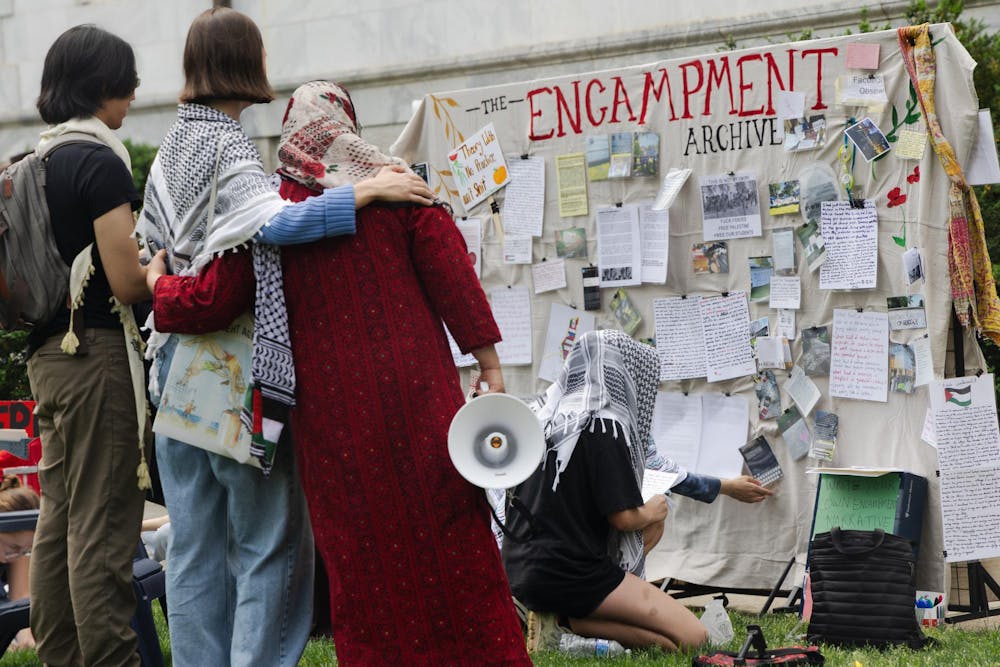Unlike last year, when hundreds of people gathered day after day on the Emory University Quadrangle to protest, about 50 people attended yesterday’s protest, which focused on the one-year anniversary of a pro-Palestine encampment on the Quad. And unlike two years ago and last year, police did not end a protest on April 25.
At yesterday’s protest, students, faculty and community members assembled to demand that the University divest from Israel and that University President Gregory Fenves resign — one year after police arrested 28 people on the Quad.
Candler School of Theology Associate Professor of Historical Theology and Christian Worship L. Edward Phillips (79T) said the smaller protest was “indicative of the kind of fear” the Trump administration has caused students to feel.
“It’s clear that there’s just a lot of people who are afraid,” Phillips said. “You don’t have to actually arrest people sometime to suppress freedom of speech.”
Similarly, David Meer (26G), one of the event organizers, attributed the low turnout to fears of Immigration and Customs Enforcement (ICE) cancelling international students’ visas who have spoken out against the conflict in the Middle East.
“People are really afraid that if they are randomly unlucky, they show up to a protest and they’ll never be seen again,” Meer said.

Protestors gather on the Emory University Quadrangle in memory of the April 25, 2024 encampment.
In March, the Trump administration began revoking the visas of international students who were involved in activities that went against the country’s national interest in foreign policy. ICE terminated four Emory community members’ visas on April 10. During the April 25 protest, the U.S. Department of Justice announced that the Trump administration was reversing its decision to cancel thousands of student visas.
Emory Students For Socialism co-President Zachary Hammond (23Ox, 25C) said he was happy with the turnout and noted that many students may not have been able to attend due to their upcoming finals.
At the protest, organizers created an art display where demonstrators could add letters, art and objects from last year’s protests. Some people pinned up photos from the 2024 encampment.
Meer was the first speaker at the event. He said that police arrested him on campus during the encampment last year, while he was “walking off the Quad.” Additionally, Meer said that Fenves acted as the “judge, jury and executioner” last year when the Emory administration ordered police to end the encampment.
“The main purpose of this event, in my eyes, is to remember, to bring light to this injustice inflicted by Fenves on the Emory people,” Meer said.
A student who said she was from the Gaza Strip spoke after Meer. The student said that the Emory School of Medicine was “enabling genocide” by suspending Umaymah Mohammad after Mohammad said a professor who volunteered in the Israeli Defense Forces participated in genocide. Additionally, the student criticized the Rollins School of Public Health for not speaking out against the current conflict in the Middle East.
“Somehow, people in these institutions are still silent,” the speaker said. “To the Emory community, especially my peers in public health, I ask you to recommit to standing in solidarity and doing the work. Public health is anti-genocide. It is decolonial, and settler colonialism is a determinant of health. We need to do more, and we need to keep Gaza and Palestine at the forefront of our minds.”
The final speaker was Associate Professor of Physics Daniel Weissman, who recounted his experience watching police end the encampment last April.
“I was only here for a few minutes last year, which was long enough to get pepper-sprayed,” Weismann said.
Weissman credited organizers, such as Meer, for their hard work organizing protests during their time at Emory.
“I don’t know how many hours are spent in boring meetings and planning logistics for that protest and for the many others that led up to it and that have followed it,” Weissman said. “That’s the crucial work that needs to be done.”
Meer said he organized the event because he wants people to remember last year’s protest and police response. During the breakup of last year’s encampment, police tased one protester and used irritant spray and pepper bullets to disperse the crowd.
“I want people to know the horrors of it and I want to make sure that the cause is not forgotten and people are not afraid to speak out,” Meer said.
In addition to national fears about visa cancellations and deportations by ICE, Meer said the low turnout of yesterday’s protest was also due to the Emory community’s “local trauma” from the University and police response to the April 25, 2024, encampment.
“They saw what could happen to them,” Meer said. “They saw that if Fenves doesn't like what's being said, he will shut it down and he will shut it down with guns and handcuffs and tasers. And people were afraid of showing up today, because that's what they thought would happen.”

Spencer Friedland (26C) is the Editor-in-Chief of The Emory Wheel. He is double majoring in Philosophy and Film. Outside of the Wheel he is a member of Emory's Honor Council and Franklin Fellowship. After college he is planning on attending law school.









